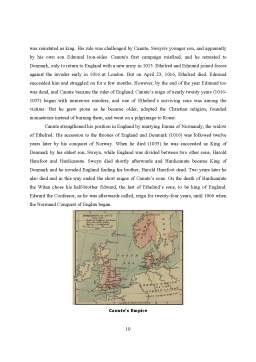Cuprins
- 1. Introduction
- 2. The Scandinavian Invasions of England
- 3. Scandinavian place names
- 4. Scandinavian loanwords
- 5. Conclusion
- 6. Bibliography
Extras din proiect
1. Introduction
During the history, the British Isles have been invaded by many tribes as Romans, Celts, Angles, Saxons, Jutes and Scandinavians (or Vikings). In this essay I will concentrate on the Scandinavians invasions and the influences they had on the English language.
The Age of the Vikings, starting around year 750 AD, had an important role in the making of modern Europe. Building ships was something the Vikings were especially good at, and they had excellent skills as sailors and navigators, which took them not only all over Europe but also as far as Constantinople and North America. However, it is their interest in Britain that will be focused upon here. The Scandinavian colonisation of the British Isles had a considerable effect on the English language and vocabulary, as well as culture.
The great number of place names of Scandinavian origin (approximately 1400) can be still found today in Britain. Endings as –by, -thorp, -toft are some of the most typical Scandinavian place-names elements.
Scandinavians had also a big influence on the vocabulary. Today, many of the words related to daily life have a Scandinavian origin: eye, window, odd, take or die.
2. The Scandinavian Invasions of England
The first appearance of the Vikings in the history of English is, according to the Anglo-Saxon Chronicle, in the year 787. They were a seafaring people who came from the Norwegian fiords and the neighbouring peninsula of Denmark. It was as raiders that the Vikings first came to England, where the monasteries were their favourite objects of attack.
The earliest attacks were made by Norwegians on Lindisfarne and Jarrow in 793. In the next year Norse raiders landed on Lambay Island off the north coast of Ireland and invaded Skye, beginning their long hold on the northern and western island of Scotland, which was eventually extended to Southerland, Caithness, Ross and Cromarty. The Isle of Man was raided in 798, and Iona was twice plundered, in 802 and 806. Some of the abbeys who survived the raids were left to mourn both their murdered comrades and the loss of the gold and silver that had adorned their church.
After fifty years of terror, the Danes began their attacks on the east coast of England in 835 under the King Egbert. After this, Wessex was attacked from the south, where pirate bands joined the Cornish in attacks on the coast. Those which suffered most severely were the eastern kingdoms. In spite of some help from Wessex, both Mercia and Northumbria submitted to the conqueror. In 866 a large Danish army plundered East Anglia and in 867 captured York. In 870 Danes conquered East Anglia and Edmunds, its king, met a cruel death in resisting to the invaders. The memory of his martyrdom was vividly preserved in English tradition for nearly two century. A festival is still accorded to this saint in the Anglican calendar, and Bury St. Edmunds is named after him.
The Martyrdom of St. Edmund (870 C. E.)
At this point, the eastern part of England was largely in the hands of the Danes so they began turning their attention to Wessex.
From now on, Alfred, the grandson of Egbert, became a prominent figure in the defence of Wessex. He was born at Wantage in 849. Alfred’s mother, Osburga, who was of Jutis descent, died when Alfred was only seven years old, and his father died two years later. His eldest brother had reigned for only two years. His next two brothers both died young, reigning for five years each.
Alfred first entered the war in 871 at the Battle of Ashdown, which he prematurely initiated from unfavourable ground, while his brother, King Ethelred, was still at mass. In Easter of the same year Alfred became King of Wessex, on his brother death after a reign of five years. The fortunes of Wessex and of England now depended upon King Alfred, a young man of twenty-one. The Danes were masters of Mercia and Northumbria, and they soon penetrated far into Wessex. In 876 they were at Wareham, in Dorset, where they joined hands with the Cornish. In January 878 they made a surprise attack on Chippenham, where the West Saxon army lay, and Alfred escaped with difficulty.
Preview document
Conținut arhivă zip
- Scandinavian Infuences on the English Language.doc




























